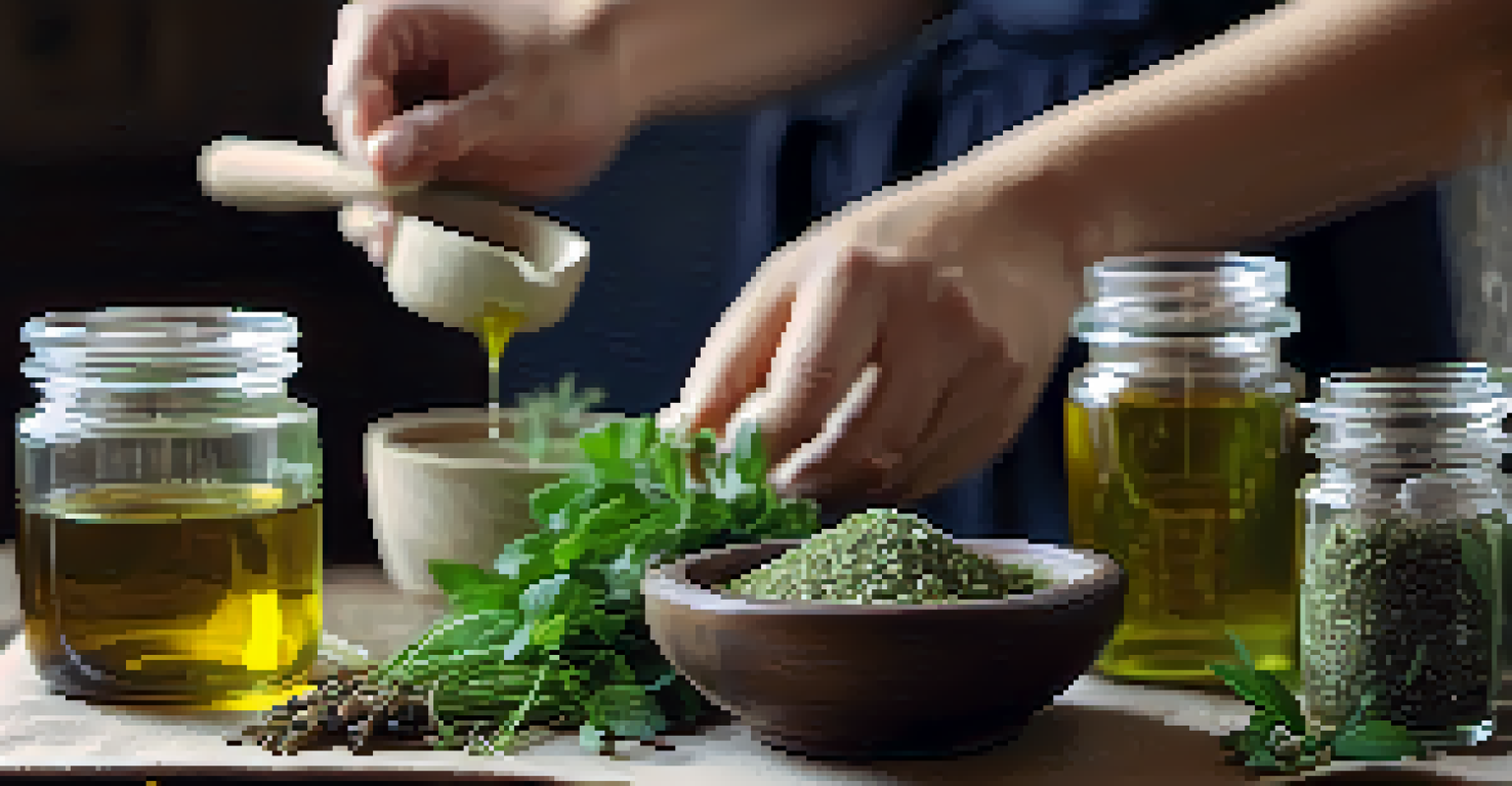Herbal Medicine: A Cornerstone of Naturopathic Preventive Care

Understanding Herbal Medicine in Naturopathy
Herbal medicine has been an integral part of healthcare for centuries, often serving as the foundation for many natural healing practices. In the context of naturopathy, it emphasizes the use of plants and their extracts to maintain health and prevent illness. This approach not only addresses symptoms but also aims to uncover and treat the root causes of health issues.
Herbs are the Earth's endless capability to heal.
The use of herbs is deeply rooted in various cultures worldwide, from traditional Chinese medicine to Ayurveda in India. These practices highlight the understanding that nature provides us with powerful tools for healing. By harnessing these natural resources, naturopathic doctors can offer holistic care that aligns with the body’s innate healing abilities.
Incorporating herbal medicine into preventive care allows individuals to support their health proactively. Instead of waiting for illness to strike, this approach encourages the use of herbs to bolster the immune system, enhance vitality, and promote overall well-being.
The Role of Herbs in Preventive Health
Preventive health is about taking steps to avoid disease rather than simply treating it after it occurs. Herbs play a crucial role in this proactive approach by providing essential nutrients and compounds that support bodily functions. For instance, herbs like echinacea are known for their immune-boosting properties, while ginger can aid digestion and reduce inflammation.

By integrating these herbs into daily routines, individuals can create a robust foundation for their health. This might involve drinking herbal teas, incorporating spices into meals, or using herbal supplements. Each method allows for a natural infusion of health benefits that can help stave off potential health concerns.
Herbal Medicine Supports Preventive Care
Incorporating herbs into daily routines can proactively enhance health and prevent illness.
Moreover, preventive care with herbs often involves lifestyle changes that promote overall wellness. This might include dietary adjustments, stress management techniques, and regular physical activity, all complemented by the wisdom of herbal remedies.
Popular Herbs and Their Preventive Benefits
There’s a vast array of herbs that offer unique health benefits, making them essential players in a preventive care strategy. For example, turmeric is celebrated for its anti-inflammatory and antioxidant properties, making it a powerful ally against chronic diseases. Similarly, garlic is known for its cardiovascular benefits and immune-boosting effects.
Let food be thy medicine and medicine be thy food.
Other noteworthy herbs include ashwagandha, which helps combat stress and promotes mental clarity, and milk thistle, renowned for its liver-protective qualities. These examples illustrate how diverse and beneficial herbal medicine can be when integrated into daily health practices.
Choosing the right herbs often depends on individual health goals, making it vital to consult with a healthcare provider. Personalized recommendations can ensure that the herbs used are aligned with one’s unique health profile, maximizing their preventive potential.
Herbal Medicine: A Safe Alternative
One of the appealing aspects of herbal medicine is its reputation for safety and minimal side effects when used correctly. Unlike many pharmaceuticals, which can come with a laundry list of adverse effects, many herbs have been used for generations with little risk. This makes them a preferred option for those seeking natural alternatives to conventional treatments.
However, it’s crucial to approach herbal remedies with respect and knowledge. Just because something is natural doesn’t mean it’s always safe for everyone. Factors such as dosage, preparation method, and individual health conditions can influence the efficacy and safety of herbs.
Diverse Herbs Offer Unique Benefits
A variety of herbs, such as turmeric and garlic, provide specific health advantages that can be tailored to individual needs.
Consulting with a qualified naturopathic doctor can help navigate these complexities. They can provide guidance on the appropriate use of herbs, ensuring a safe and effective integration into one’s wellness routine.
Integrating Herbal Medicine into Daily Life
Incorporating herbal medicine into daily life can be both simple and enjoyable. Starting with small changes, such as adding fresh herbs to meals or brewing herbal teas, can make a significant difference in overall health. Not only do these practices enhance flavor, but they also infuse the body with beneficial compounds.
Additionally, exploring herbal supplements can be an effective way to reap the benefits of herbs without altering daily routines too much. These supplements come in various forms, including capsules, tinctures, and extracts, making it easy to find a suitable option for personal preferences.
Creating a consistent practice around herbal medicine encourages mindfulness about health. This dedication to preventive care not only fosters a deeper connection with nature but also empowers individuals to take charge of their health journey.
The Future of Herbal Medicine in Naturopathy
As interest in natural and holistic healthcare continues to grow, herbal medicine's role in naturopathy is more prominent than ever. Researchers are increasingly exploring the potential of herbs, leading to a better understanding of their mechanisms and benefits. This growing body of evidence supports the use of herbal remedies in preventive care, further legitimizing their place in modern medicine.
Moreover, the integration of herbal medicine with other health modalities, including conventional medicine, is becoming more common. This collaborative approach allows for a more comprehensive understanding of health and wellness, offering patients a wider range of options.
Safe and Natural Healing Alternatives
Herbal medicine is often regarded as a safer option compared to pharmaceuticals, but it requires knowledgeable use to ensure effectiveness.
Looking ahead, it’s essential to advocate for the responsible use of herbal medicine. This involves education about safe practices, quality standards for herbal products, and ongoing research to uncover the full potential of nature’s pharmacy.
Embracing Herbal Medicine for Holistic Wellness
Ultimately, embracing herbal medicine as part of a naturopathic preventive care plan encourages a holistic approach to health. It shifts the focus from merely treating illness to nurturing well-being and vitality. This perspective aligns perfectly with the principles of naturopathy, which prioritize the body's natural ability to heal itself.
By incorporating herbs into daily life, individuals can foster a greater sense of balance and harmony within their bodies. This not only promotes physical health but also supports emotional and spiritual well-being, acknowledging the interconnectedness of all aspects of health.

In conclusion, herbal medicine stands as a cornerstone of naturopathic preventive care, offering a wealth of benefits that can enhance the overall quality of life. By understanding and utilizing these natural remedies, we empower ourselves to take proactive steps toward lasting health.